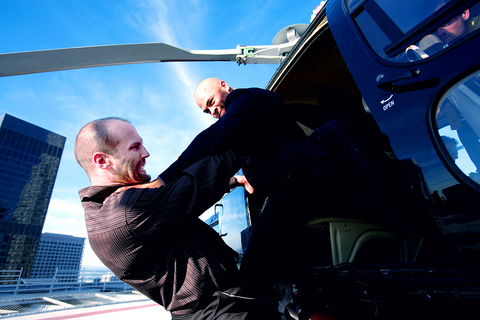For a movie premised on unrelenting action, Crank proves fatally turgid. The premise takes high concept to a new low. Chev Chelios (Jason Stratham), hit man extraordinaire, wakes up to learn he's been dosed with "the Beijing cocktail," a poison whose lethal effects can be fended off only by a constant surge of adrenaline. Thus, with utmost speed, in this retread of Speed, Chev rampages through Los Angeles seeking Verona (Jose Pablo Cantillo), the rival who poisoned him, and the means of sustaining his neck-bulging buzz.
He chugs Red Bull, gobbles energy supplements, injects ephedrine, fondles a defibrillator, licks cocaine off a bathroom floor, snorts nasal decongestant by the bottle and rapes his girlfriend (Amy Smart, playing dumb) in the middle of Chinatown. Mostly, however, he's powered by rage, which he vents through explosions of violence and misanthropy.
The writing and directing team of Mark Neveldine and Brian Taylor jack up the action with all manner of gore, gimmickry and hysterical camerawork, none of which is as vigorous as the equal-opportunity hatred they exhibit toward the denizens of Los Angeles, be they black, Latino, Asian, Muslim, gay, female or theater customers paying to see a decent action flick.

PHOTO COURTESY OF PANDASIA
That last demographic may feel most insulted of all when, in the climactic showdown, Verona holsters his gun to plunge another syringe of poison into Chev's neck — you know, the one that doesn't work — then turns his back to make a getaway. He may be one of the dumbest villains in movie history, but you've got to root for him. Dead, Chev puts everyone out of his misery.

April 28 to May 4 During the Japanese colonial era, a city’s “first” high school typically served Japanese students, while Taiwanese attended the “second” high school. Only in Taichung was this reversed. That’s because when Taichung First High School opened its doors on May 1, 1915 to serve Taiwanese students who were previously barred from secondary education, it was the only high school in town. Former principal Hideo Azukisawa threatened to quit when the government in 1922 attempted to transfer the “first” designation to a new local high school for Japanese students, leading to this unusual situation. Prior to the Taichung First

The Ministry of Education last month proposed a nationwide ban on mobile devices in schools, aiming to curb concerns over student phone addiction. Under the revised regulation, which will take effect in August, teachers and schools will be required to collect mobile devices — including phones, laptops and wearables devices — for safekeeping during school hours, unless they are being used for educational purposes. For Chang Fong-ching (張鳳琴), the ban will have a positive impact. “It’s a good move,” says the professor in the department of

On April 17, Chinese Nationalist Party (KMT) Chairman Eric Chu (朱立倫) launched a bold campaign to revive and revitalize the KMT base by calling for an impromptu rally at the Taipei prosecutor’s offices to protest recent arrests of KMT recall campaigners over allegations of forgery and fraud involving signatures of dead voters. The protest had no time to apply for permits and was illegal, but that played into the sense of opposition grievance at alleged weaponization of the judiciary by the Democratic Progressive Party (DPP) to “annihilate” the opposition parties. Blamed for faltering recall campaigns and faced with a KMT chair

Article 2 of the Additional Articles of the Constitution of the Republic of China (中華民國憲法增修條文) stipulates that upon a vote of no confidence in the premier, the president can dissolve the legislature within 10 days. If the legislature is dissolved, a new legislative election must be held within 60 days, and the legislators’ terms will then be reckoned from that election. Two weeks ago Taipei Mayor Chiang Wan-an (蔣萬安) of the Chinese Nationalist Party (KMT) proposed that the legislature hold a vote of no confidence in the premier and dare the president to dissolve the legislature. The legislature is currently controlled